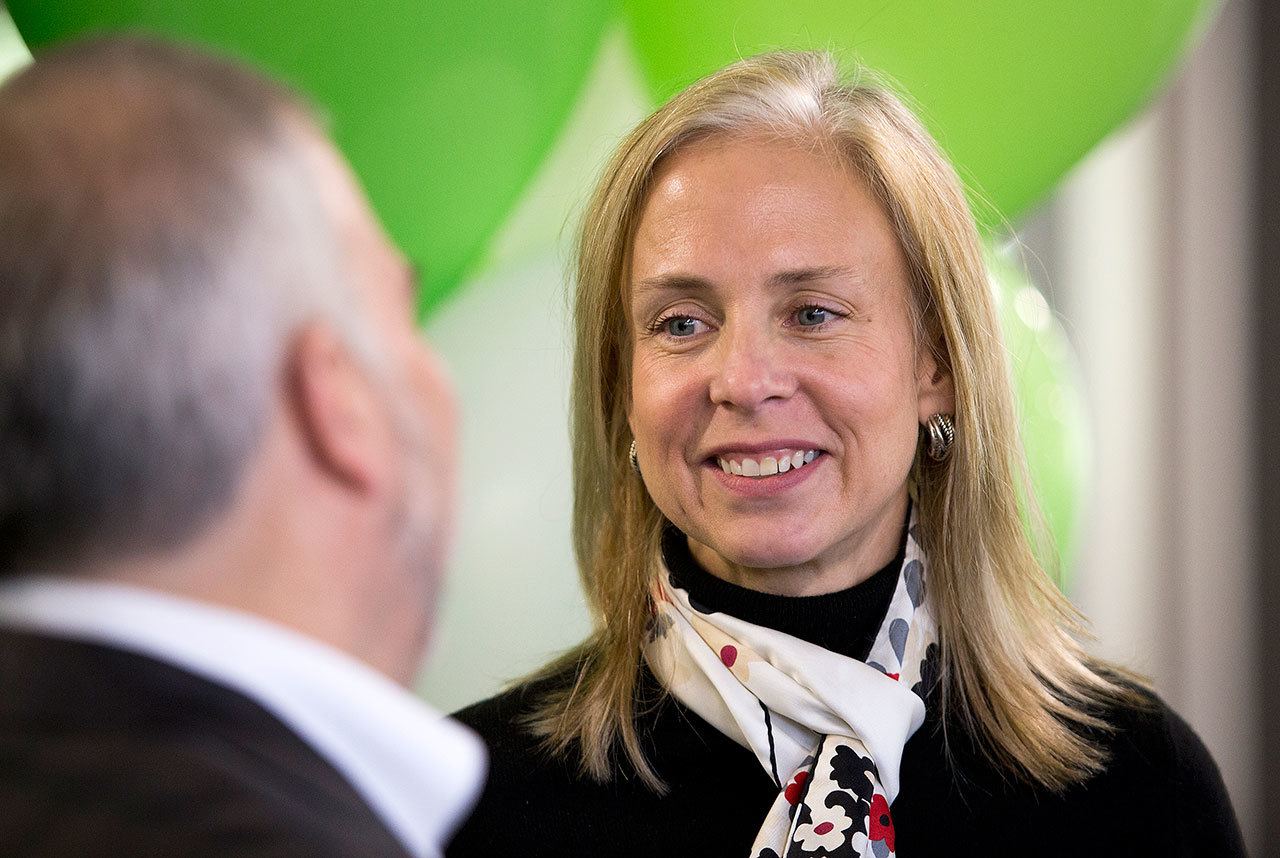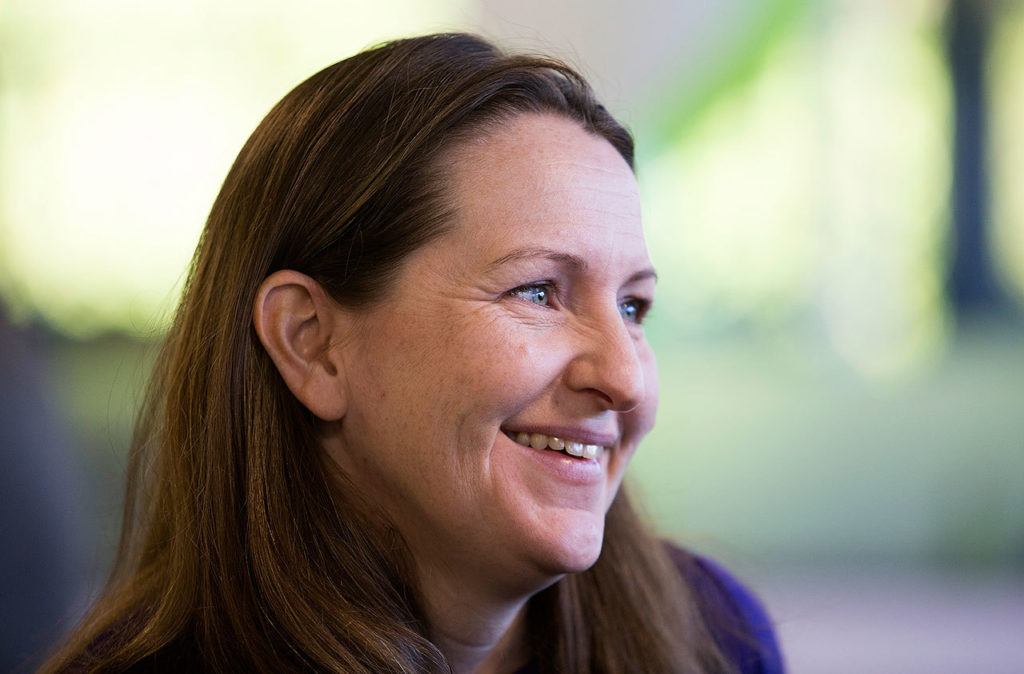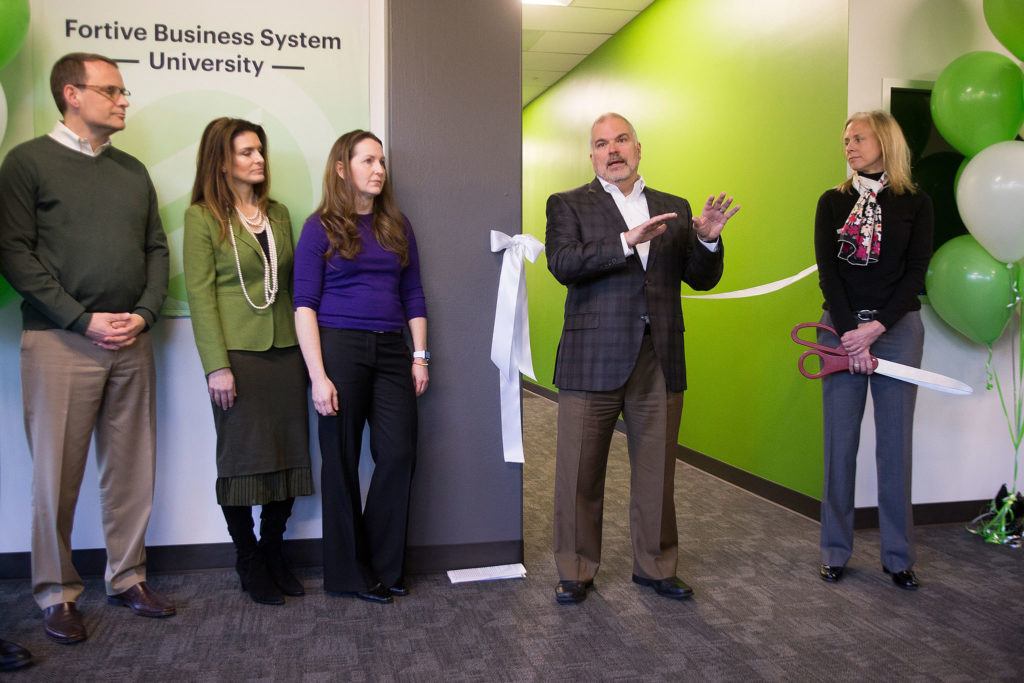EVERETT — It’s hard to ask successful companies to be great today, but better tomorrow.
“Because you kind of want to do the high-five dance and take a breather,” said Barbara Hulit, a Fortive senior vice president.
Asking companies and employees to get better each and every day is part of the DNA of Fortive, the Fortune 500 company that opened its corporate headquarters at the Fluke campus near Paine Field in Everett last year.
Fortive owns around 20 companies that it brought along when it broke from the Danaher Corp. last summer. The Fortive companies make everything from electronic test tools at Fluke to gas pump equipment to sensors that make sure milk is safe to drink.
Now, Fortive has opened a university in Everett to help teach this continuous-improvement mindset — and reinforce its culture — for the company’s 24,000 employees. The center is called Fortive Business System University.
At a ceremony celebrating the opening last month, Fortive President and CEO Jim Lico noted that the culture happens where the work gets done, but said the university will be a place of “unending learning.”
“What I’m most excited about is bringing people together on a regular basis to celebrate our culture, to work on making the company better and the compounding effect of how that makes a great company over a long period time,” Lico said. “This is one of the places where that will occur.”
Hundreds of Fortive employees will travel to Snohomish County each year to learn while staying at Everett or Mukilteo hotels and eat in the community’s restaurants. Danaher had a similar program called the Danaher Business System with its own training facility outside of Chicago. Fortive didn’t adopt the Danaher system, Hulit said.
“We had a bunch of people who were practicing this day in and day out,” Hulit said. “They were doing it the day before separation and they continued to do that the day after. In that sense, it’s not like we took the recipe book and brought it with us to learn to make the soup. We’ve been making the soup. We just continued making the soup.”
The roots of the business philosophy for both Fortive and Danaher comes from Jacobs Vehicles System, also known as Jake Brake, a Connecticut company that manufactures auto parts. In the separation, Jake Brake joined the Fortive group. Danaher purchased Jake Brake in the 1980s and the company was using lean manufacturing philosophy to help remove waste from the manufacturing line. Lean manufacturing was developed by Toyota and has been adopted by hundreds of companies, including Boeing.
Danaher’s leadership at the time saw it as a powerful tool and brought it to other companies in its portfolio. Over time, Danaher, and now Fortive, evolved the principles.
For one, the method was taken from the factory floor and applied to other parts of its businesses, such as research and development and marketing. The companies also learn from each other. For instance, Fluke had a strong presence in China when it was purchased and has helped Danaher, and now Fortive, to grow in that market.
The philosophy also has changed from reducing waste to growing the business and cultivating leadership. Fortive does a lot of the “voice of the customer,” reaching out to customers of new products to find out what went right and what went wrong.
Fortive also looks at how it develops talent to help accelerate careers. The key to the philosophy is improving each day.
“The underpinning of all FBS is continuous improvement,” Hulit said. “It’s just, I saw something that looked pretty good, I made it better and I shared it. Then I got more experience with it, so I can make it better again and then I share it again.”
She said the business philosophy was so important to Danaher, and now Fortive, that the company considers it when it looks to buy other businesses.
“We’ve walked from deals historically where the culture fit isn’t there, that’s how strongly we believe in what the Fortive Business System is,” Hulit said. “If we look at the management team or business and it’s the round peg-square hole, we’re not going to buy it.”
To reinforce this culture, Fortive has set up the university in Everett. It’s a place where employees from different companies can come together and learn a common language and learn from each other. The university consists of three classrooms on the first floor of the Fluke campus.
Fortive chose Everett for the center to be close to Fluke, which has a factory, but also to be close to Fortive’s corporate offices.
The first group to go through the training center had a project mid-week to put together 600 hygiene kits for Cocoon House in Everett and the Millionair Club in Seattle, two charities that help with the homeless. Kirsten Paust, Fortive Business System Office vice president, had the group of 40 employees put together the kits as a team-building exercise.
The employees had to make a manufacturing line and get one kit off the line every 10 seconds. They were given breaks between rounds to improve the line by figuring out the bottlenecks.
“The last one, we did what happens to all of our businesses,” Paust said. “They think they need to make one every 10 seconds and now we have extra orders so we need to make one every five seconds.”
Hulit said that she’s had CEOs tell her that they’ve hired her employees and haven’t had the results that Danaher, and now Fortive, have had. She said it’s the mindset of the employees and the culture of the company.
“The secret sauce is in the culture and stick-to-it-ness,” Hulit said. “If you think about it, we’ve been staying on the same program since the 1980s, we’ve been through multiple CEOs and now a separation and it’s the same game plan.”
Talk to us
> Give us your news tips.
> Send us a letter to the editor.
> More Herald contact information.



























